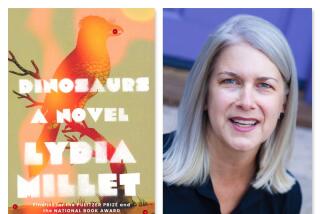Science Through a Prism
- Share via
With a new dinosaur species being cataloged every three months, ours has been called a golden era of dinosaur discovery. Last week alone, two major new findings were announced: a dinosaur hatchery with thousands of fossilized eggs found in Argentina and a rock sample providing evidence that the dinosaurs were wiped out 65 million years ago by an asteroid that smashed into Mexico’s Yucatan Peninsula. The six-mile-wide cosmic fist triggered titanic tidal waves and a decade of sulfuric acid rain.
Clearly, science has come far since 1842, when Richard Owen, a British anatomist, first joined the Greek words deinos (terrible) and sauros (lizard). The pickaxes and shovels that were paleontologists’ only tools in Owen’s day have since been supplemented by CAT scans, radiocarbon dating and other sophisticated techniques.
Owen coined “terrible lizards” as a term of respect. He saw the dinosaurs as awesome, sleekly designed, powerful creatures from an admirable ancient world. He buttressed his view not so much on hard evidence of dinosaurs’ anatomical prowess, for he had few fossil specimens to analyze. Rather, he interpreted the then-flimsy fossil record through the lens of his conservative convictions, which held that the best was often to be found in the past, from dinosaurs to kings and queens.
Owen’s theory was a kind of rebuttal to the dominant “progressionists” of his day, who saw dinosaurs as lumbering, awkward and ill-designed creatures: virtual proof of a sort of grand, evolutionary logic wherein life progresses from primitive creatures like dinosaurs to sophisticated ones like humans. Owen’s was a minority voice calling out and asking people in a progressive era to question their hubris.
The present era too is progressive. We believe that the future and its innovations hold greater promise than the past. NASA scientists are even designing spaceships that they hope will ward off any asteroid impact of the kind that killed the dinosaurs. But today there are other Richard Owens--those who speak from the sidelines, asking us to ponder whether we might be overly idealizing progress.
Some scientists, for example, point to evidence that many species of ants survived the asteroid impact that finished the dinosaurs, not by innovating but rather by employing the same old strategies that had suited them for millions of years. We may dismiss ants, much as the progressionists dismissed dinosaurs, but the fact remains that these tiny insects are now the dominant creature on Earth in terms of volume, making up more than 10% of the animal mass on land.
Although some new findings suggest that dinosaurs were more primitive than their modern relatives, reptiles and birds, the debate over what we can learn from dinosaur discovery remains as unsettled today as it was in Owen’s era. But one thing is clear. The history of dinosaur discovery offers a cautionary lesson: The way we look at scientific discovery is as influenced by cultural values as it is by objective science.






